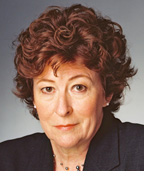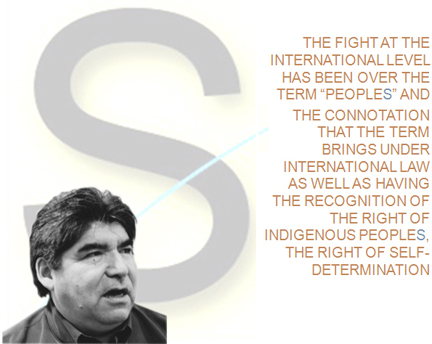
DRAFT DECLARATION
Working group of the Commission on Human Rights to elaborate a draft
declaration in accordance with paragraph 5 of General Assembly
resolution 49/214 of 23 December 1994
Commission on Human Rights resolution 2003/57
Bearing in mind General Assembly resolution 47/75 of 14 December 1992 and Part II, paragraph 28, of the Vienna Declaration and Programme of Action (A/CONF.157/23),
Reaffirming its resolution 1995/32 of 3 March 1995, in which it established an open-ended inter-sessional working group with the sole purpose of elaborating a draft declaration, considering the draft contained in the annex to resolution 1994/45 of 26 August 1994 of the Sub-Commission on the Promotion and Protection of Human Rights, entitled "Draft United Nations declaration on the rights of indigenous peoples", for consideration and adoption by the General Assembly within the International Decade of the World's Indigenous People.
Underlining the importance of concluding, at the latest in 2004, the draft United Nations declaration on the rights of indigenous peoples for consideration and adoption by the General Assembly prior to the conclusion of the International Decade of the World's Indigenous People.
Draft United Nations Declaration on the Rights of Indigenous Peoples

United Nations High Commissioner for Human Rights
2004 - 2008
Ms Arbour, a Canadian national, is the former UN High Commissioner for Human Rights and Chief Prosecutor for the International Criminal Tribunals for the former Yugoslavia and for Rwanda. She has recently been selected as the next President of the International Crisis Group.
Twenty Second Session
19-23 JULY 2004
Palais des Nations
Assembly Hall, Monday, 19 JULY 2004
Full text of speech
I have been informed that to date the working group set up by the Commission has been able to adopt only 2 of the 45 articles at first reading. That makes the implementation of the General Assembly's recommendation practically impossible. I would like, therefore, to urge all those who are involved to explore all possibilities to accelerate the process and finalize it as soon as possible. Clear commitments in this regard would be essential. The additional time granted to the working group, including its session to be held from 29 November to 3 December, may facilitate this task.
I know that considerable efforts have been made to bring governmental delegations closer on this issue. I also understand that indigenous representatives, who in the past have been committed to maintaining the original draft, are more open to considering proposals that go in the direction of improving or clarifying the text. I strongly believe that all parties should be prepared to listen and engage in constructive dialogue, and be committed to finding mutually acceptable solutions. In this case, as on many similar occasions, we must embark upon the negotiations with open minds, courage and willingness to accept results that represent a good common approach. I know this takes time and patience. But, time is not unlimited. This is why I say let us find the time to finish the process of drafting the declaration and let us commit to getting the result done within an agreed period.

(download pdf)
ASSESSING THE INTERNATIONAL DECADE:
URGENT NEED TO RENEW MANDATE AND IMPROVE
THE U.N. STANDARD-SETTING PROCESS
ON INDIGENOUS PEOPLES' HUMAN RIGHTS
Supported by the following Indigenous Nations and Indigenous and non-Indigenous organizations: Na Koa Ikaika Ka Lahui Hawai'i, Traditional Kirati Peoples' Alliance, Nepal, Samson Cree Nation, Ermineskin Cree Nation, Montana Cree Nation, Louis Bull Cree Nation, Buffalo River Denč Nation, Fédération des Organisations Autochtones de Guyane (FOAG), Native Women's Association of Canada (NWAC), Nepal Indigenous Peoples Development and Information Service Centre (NIPDISC), First Peoples Human Rights Coalition, South African First Indigenous and Human Rights Organization (SAFIHRO), Forest Peoples Programme UK, International Work Group For Indigenous Affairs (IWGIA), Netherlands Centre for Indigenous Peoples (NCIV), Canadian Friends Service Committee, and KAIROS: Canadian Ecumenical Justice Initiatives.
For Links to the above organizations - See below
It is crucial that the human rights of Indigenous peoples be explicitly affirmed through a standard-setting process leading to the adoption of a draft U.N. Declaration. While such a Declaration cannot resolve all of the fundamental issues impacting on Indigenous peoples' rights, it is an essential and significant first step. Our basic rights must be explicitly embraced within a principled international framework.
Without the adoption of minimum standards for the survival, dignity and well-being of the Indigenous peoples of the world, as carefully elaborated in the draft U.N. Declaration, there is no broad-based, cohesive and commonly-shared foundation on which the U.N. specialized agencies and other bodies, including the Permanent Forum, can base their policies and procedures.

Grand Council of the Crees
Former Ambassador to the United Nations
for the Grand Council of the Crees
(Eeyou Astchee), an NGO in consultative status with the Economic and Social Council of the United Nations.
Ted Moses Speaks to the World Conference on Human Rights, Vienna
"... structural changes must be made at the United Nations to facilitate work on one of the great outstanding human rights issues of the 21st century -- the plight of the world's indigenous peoples."
This is one of the most important provisions of all in the Draft Declaration, in its articles in the operative paragraphs, and I quote:
Indigenous peoples have the right of self-determination.
By virtue of that right, they freely determine their political status
and freely pursue their economic, social and cultural development.

This article (3) establishes the guiding principle of the entire declaration: that Indigenous Peoples may freely choose their own form of government and that they are free to determine how they conduct economic, social and cultural development. This provision parallels the provisions found in the International Covenant on Civil and Political Rights and the International Covenant on the Economic, Social and Cultural Rights, both part of the International Bill of Rights. That provision recognized that all peoples have the right of self-determination. A part of the article on self-determination states that by virtue of the right of self-determination all peoples are free to enjoy the wealth of their land and its resources and that peoples are not to be denied their own means of subsistence.
We need this United Nations Declaration on the Rights of Indigenous Peoples, we need to find a neutral jurisdiction and this Declaration gives us the possibility, the hope, that the international community will recognise and protect our rights.
This Declaration recognizes the dignity of the Indigenous Peoples, our right of self-determination, our right to land, our right to control resources, our right to practice our own religious, our own religions, our right to maintain our own cultures, our right to our own identities.
Have no illusions. This Declaration would be very difficult to enforce. It would be non-binding. But it would, at the very least, establish a high standard, set a principle and bring the administration of justice on a level with the aspirations of the Indigenous Peoples.

Ermineskin Cree Nation
Canadian Lawyer
Founder, International Organization of Indigenous Resource Development
Expert member, representing North America, of the Permanent Forum on Indigenous Issues under the Economic and Social Council of the United Nations
Economic and Social Council
E/CN.4/2000/NGO/120
22 February 2000
Commission on Human Rights
Fifty-sixth session
Item 15 of the provisional agenda
Indigenous Issues
For Links to the above organizations - See below
Since the establishment of the United Nations Working Group on Indigenous Populations in 1982, Indigenous representatives have consistently asserted the critical importance of accurately identifying Indigenous Peoples as "peoples" in the work of the United Nations.There can be no doubt that we are peoples with distinct historical, political and cultural identities and will remain so.
We are united by our histories as distinct societies, as well as by our languages, laws and traditions. In addition, the profound social, cultural, economic and spiritual relationships of Indigenous Peoples with our lands, territories and resources are unique.
Indigenous Peoples are unquestionably peoples in every legal, political, social, cultural and ethnological meaning of the term. It would be discriminatory, illogical and unscientific to identify us in the United Nations Draft Declaration on the Rights of Indigenous Peoples as anything less than peoples.
Our status as peoples is fundamental to the recognition of our right of self-determination in all its collective political, economic, social, cultural and spiritual dimensions. To deny our right to define ourselves and to be recognized as Indigenous Peoples is to deny a fundamental expression of our right to self-determination.
Regrettably, certain States persist in seeking to deny or otherwise restrict the status of Indigenous Peoples as "peoples". This is done to deny us the recognition and enjoyment of our right to self-determination on an equal footing with other peoples.
These positions are discriminatory and, therefore, run counter to the most fundamental purposes and principles of the United Nations. We hereby request, as we have done in the past, that Member States of the United Nations fully respect the UN Charter, the International Covenants and other human rights instruments in the present standard-setting process.
We continue to insist that the United Nations apply its own standards universally and equally, that it recognize and respect the same fundamental human right to self-determination to us as for other peoples in the world, that it act without prejudice and without discrimination.
of Indigenous Peoples
A Critical Challenge for the International Community
Voices from a forum at the 61st Session of the
United Nations Commission on Human Right
13 April 2005
Presented by Amnesty International, la Fédération Internationale des
Ligues des Droits de l'Homme (FIDH), the Netherlands Centre for
Indigenous Peoples (NCIV), Friends World Committee for Consultation
(Quakers), and Rights and Democracy
October 2005
DOCUMENT SOURCE
Canadian Friends Service Committee
Aboriginal Affairs Committee
This same information is available as a text only document.

LINKS TO ORGANIZATIONS WHO SIGNED ON TO
AND SUPPORTED THE JOINT STATEMENTS ABOVE:
The Maskwacis Cree includes Samson Cree Nation, Ermineskin Cree Nation, Louis Bull Tribe and Montana Cree Nation.

POLITICS OF INCLUSION

S I T E M A P M A P A D E L S I T I O
dbn@dialoguebetweennations.com
Copyright Natalie Drache 1999